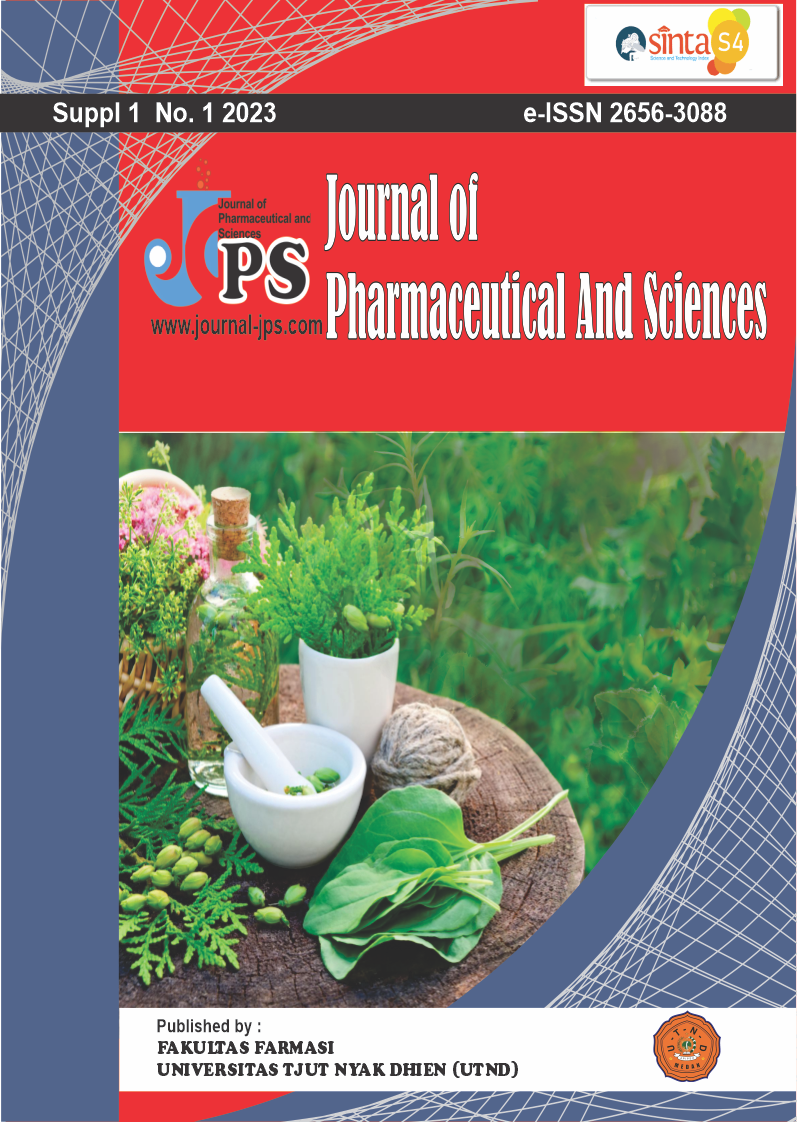Formulation of body scrub from a combination of white ginger (Curcuma zedoaria) and biji kurma (Phoenix dactylifera)
Main Article Content
Page: 400-406
Abstract
Body scrub is a cosmetic form that removes dead skin cells caused by free radicals from various pollutants and ultraviolet (UV) radiation so skin cells become more accessible to regenerate. White turmeric (Curcuma zedoaria) and date seeds (Phoenix dactylifera) are plants that contain bioactive compounds to maintain and nourish the skin and have antioxidant activity. Besides, date seeds also have the potential as exfoliating agents to facilitate the release of dead skin cells. This study aimed to formulate a body scrub containing ethanol extract of white turmeric rhizome and date seed powder with five types of formulas (K+, K-, F1, F2, F3). This type of research is a true experimental, which includes the formulation and stability test. The stability test was conducted with the Cycling test method in 6 cycles (1 cycle for 2x24 hours) at temperatures of -4oC and 40oC and four months for stability at room temperature. Parameters observed include organolepticity, homogeneity, dispersibility, adhesion, pH, and viscosity. The results showed that this body scrub did not show any change in the organoleptic character, homogeneity, spreadability, adhesion, or pH values that met the requirements of a body scrub preparation. Viscosity met the requirement for stability test for room temperature in four months. This study concludes that the combination of ethanol extract of white turmeric rhizome and date seed powder seeds can be formulated to be a body scrub dosage form.
Downloads
Article Details

This work is licensed under a Creative Commons Attribution-NonCommercial-ShareAlike 4.0 International License.
References
Akbar, S. (2020). Handbook of 200 medicinal plants: A comprehensive review of their traditional medical uses and scientific justifications. In Handbook of 200 Medicinal Plants: A Comprehensive Review of Their Traditional Medical Uses and Scientific Justifications. https://doi.org/10.1007/978-3-030-16807-0
Alam, M. Z., Ramachandran, T., Antony, A., Hamed, F., Ayyash, M., & Kamal-Eldin, A. (2022). Melanin is a plenteous bioactive phenolic compound in date fruits (Phoenix dactylifera L.). Scientific Reports, 12(1), 1–12. https://doi.org/10.1038/s41598-022-10546-9
Budianor, B., Malahayati, S., & Saputri, R. (2022). Formulasi dan Uji Stabilitas Sediaan Krim Ekstrak Bunga Melati Putih (Jasminum Sambac L.) Sebagai Anti Jerawat. Journal Pharmaceutical Care and Sciences, 3(1), 1–13. https://doi.org/10.33859/jpcs.v3i1.204
Elmitra, E. (2023). Formulasi dan uji aktivitas antioksidan sediaan krim body scrub ekstrak etanol daun katuk (sauropus androgynus l.) dengan metode dpph. jafp, 8(1), 12-20. https://doi.org/10.56350/jafp.v8i1.94
Elmitra. (2017). Dasar-Dasar Farmasetika dan Sediaan Semi Solid (1st ed.). Yogyakarta: Deepublish.
Fahamsya, A. (2023). Formulasi dan uji fisik ekstrak biji alpukat (persea aericana mill) dengan cangkang telur sebagai body scrub. Usadha, 2(3), 15-22. https://doi.org/10.36733/usadha.v2i3.7478
Garg, A., D. Aggarwal, S. Garg, and A. K. S. (2002). Spreading of Semisolid Formulations, An Update. Pharmaceutical Technology, 2, 84–105.
Hidayati, N. (2023). Formulasi dan uji sediaan krim body scrub oatmeal dan yogurt sebagai zat aktif. Medimuh Jurnal Kesehatan Muhammadiyah, 4(2), 59-68. https://doi.org/10.37874/mh.v4i2.1068
Jun, P., Rahmat, E., Han, C. H., Yang, C., & Kang, Y. (2021). Traditional Chinese Medicine and Traditional Indonesian Medicine: A Comparative Review of Herbal Medicines Restricted in Pregnancy. Chinese Journal of Integrative Medicine, 27(10), 794–800. https://doi.org/10.1007/s11655-021-3487-7
Meer, S., Akhtar, N., Mahmood, T., & Igielska-Kalwat, J. (2017). Efficacy of phoenix dactylifera l. (date palm) creams on healthy skin. Cosmetics, 4(2), 13. https://doi.org/10.3390/cosmetics4020013
Pangestu, A., Widyasari, R., & Sari, D. (2015). Formulasi krim body scrub ekstrak etanol beras merah dengan variasi konsentrasi span 80 dan sween 80 sebagai emulgator. Jurnal Kesehatan Khatulistiwa, 1(2), 164. https://doi.org/10.26418/jurkeswa.v1i2.43000
Pratama, L., Purwanta, M., & Qurnianingsih, E. (2019). Efektivitas ekstrak etanol biji kurma mesir (phoenix dactylifera l.) sebagai antibakteri terhadap streptococcus pyogenes secara in vitro. Jurnal Kedokteran Syiah Kuala, 19(3). https://doi.org/10.24815/jks.v19i3.18113
Saryono, S., Retnani, H., & Santoso, D. (2015). Date seeds steeping (phoenix dactylifera) strengthen sperm cells membrane and reduce malondialdehyde level. Jurnal Ners, 10(2), 355. https://doi.org/10.20473/jn.v10i22015.355-359
Siregar, Y., Rudiana, T., & Riyadi, W. (2018). Identifikasi komposisi kimia dan uji aktivitas antioksidan dari biji kurma (phoenix dactylifera). Jurnal Kimia Valensi, 4(2), 182-189. https://doi.org/10.15408/jkv.v4i2.8818
Sopianti, D. (2023). Variasi konsentrasi emulgator span-tween 80 pada formulasi krim body scrub ekstrak etanol daun sirih merah (piper crocatum ruiz & pav). Oceana Biomedicina Journal, 6(1). https://doi.org/10.30649/obj.v6i1.112
Tariq, S., Imran, M., Mushtaq, Z., & Asghar, N. (2016). Phytopreventive antihypercholesterolmic and antilipidemic perspectives of zedoary (Curcuma Zedoaria Roscoe.) herbal tea. Lipids in Health and Disease, 15(1), 1–10. https://doi.org/10.1186/s12944-016-0210-y
Warnasih, S., Widiastuti, D., Hasanah, U., Ambarsari, L., & Sugita, P. (2019). Antioxidant activities and flavonoid extract of curma seeds. Jurnal Ilmiah Ilmu Dasar Dan Lingkungan Hidup, 19(1), 34–38.
Wenas, D. (2021). Kajian potensi ekstrak beras merah dan aplikasinya dalam perawatan kulit. Sainstech Farma, 14(2), 121-126. https://doi.org/10.37277/sfj.v14i2.962
Yulistiyaningsih, E., Legowo, D.B., Safitri, C. I. N. . (2021). Formulasi dan Stabiltas Mutu Fisik Losion Pencerah dari Minyak Atsiri Kunyit Putih (Curcuma mangga val.). Seminar Nasional Pendidikan Biologi Dan Saintek (SNPBS) Ke-VI, 292–300.
Zalukhu, M. L., Phyma, A. R., & Pinzon, R. T. (2016). Proses Menua, Stres Oksidatif, dan Peran Anti Oksidan. Cermin Dunia Kedokteran, 43(10), 733–736. https://doi.org/10.55175/CDK.V43I10.870.





